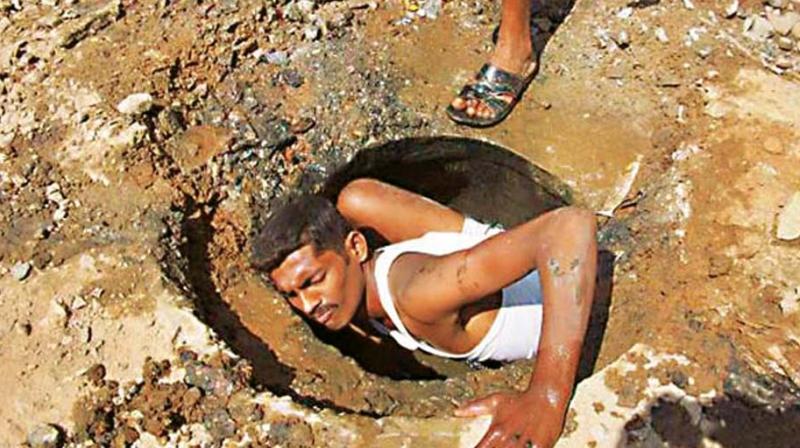Why hasn't there been a single conviction in manual scavenging cases?

The deaths of workers forced to clean human excreta in manholes, sewage treatment tanks or septic tanks cannot be termed an accident as it amounts to murder. Three workers, Maddhe Gowda, Narayana Swami and Srinivas paid with their lives owing to the abhorrent, inhuman and illegal practice of manual scavenging on January 7 this year in an apartment complex in HSR Layout.
Ironically, on the day that India became the first country to orbit Mars on September 24, 2014, two Dalit contract workers of the Bangalore Water Supply and Sewerage Board (BWSSB) , Sridhar Nagarajappa (20), and Bandri Marappa (22), too met a similar barbaric death, suffocating in a manhole in Hennur. And shamefully, three workers died in a manhole opposite a top scientific establishment, Centre for Artificial Intelligence and Robotics near C.V. Raman Nagar on March 7 last year.
Sadly, while the country is making technological advancements, workers continue to perish in the IT capital of the country from asphyxiation while handling human excreta with their bare hands.
Going by information collated by the All India Central Council of Trade Unions (AICCTU), at least 75 workers have died while performing manual scavenging in 34 such incidents between 2008 and 2018 in Karnataka.
A majority of these workers are Dalits and this obnoxious practice of manual scavenging is squarely rooted in the caste system and untouchability. The Prohibition of Employment of Manual Scavengers and their Rehabilitation Act, 2013, that makes the employment of manual scavengers a punishable offence, was enacted owing to the failure of the existing laws to eliminate it. But it too continues to be openly flouted. The practice has even taken on new dimensions in Bengaluru with the state government ordering all residential complexes of over 50 units to establish Sewerage Treatment Plants (STP). Presently, there over 2000 STPs in the city, but as no regulations have been framed for their maintenance or to ensure the safety of the workers cleaning them, we are seeing a new kind of manual scavenging now.
What stops the governments or the scientific and engineering communities from developing technologies and adopting practices for mechanical cleaning of human excreta and the sewerage network? Why are Dalit workers made to pay with their lives for this inhuman practice? Why has there not been a single conviction in a case of manual scavenging?
The fact that the inhuman practice continues in this day and age should shock our collective conscience. The employment of workers to perform manual scavenging should be treated as culpable homicide, and it's time the state government handled such cases with an iron hand to ensure these workers’ right to life and dignity.
Besides ensuring the identification and rehabilitation of the workers employed, those responsible for their deaths must be criminally prosecuted and convicted.

